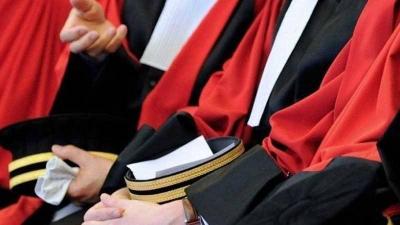Judges in Lebanon have sounded the alarm by announcing an open-ended strike and a complete cessation of work, protesting the financial and social conditions that judges are facing, and rejecting the "oppression and humiliation" inflicted on the judicial body as a whole. This has led to the disruption of work in investigative departments and most courts at various levels. The unprecedented aspect of this movement was the participation of senior judges, including members of the Supreme Judicial Council, others from the Audit Bureau, and the State Consultative Council. Supreme Judicial Council President Judge Souheil Abboud asserted that "the judiciary will not resign from its responsibilities and will remain the essential pillar for building the state."
The striking judges maintain that the crisis in the judiciary has reached a peak and that it is no longer acceptable to remain silent about it, as it has brought the judicial authority to its worst state. One judge involved in the open strike plan pointed out that "the judiciary is undergoing a harsh war, beginning with political interference in judicial files, attempts to undermine investigations into sensitive cases, obstructing judges’ work, and then blaming them for the delays." The judge, who requested anonymity, confirmed to Al-Sharq Al-Awsat that "the attempts of the political authority to humiliate and oppress judges will not go unnoticed, and this constitutes a direct assault on the judiciary which will backfire on them." He stated: "It is no longer acceptable to undermine the judiciary and harm the dignity of judges."
Lebanese judges are living under exceedingly difficult conditions. In addition to the harsh financial circumstances resulting from the collapse of the national currency and the loss of purchasing power of their salaries, courthouses face daily power and water outages, lack of cleanliness, and shortages of stationery and daily working tools, forcing judges to purchase these items out of their own pockets to manage their courts. The judge involved in organizing the strike added: "We have lost our patience, and swift solutions are required." Regarding the potential timetable for ending the strike, he emphasized that "suspending the strike depends on resolving the problems that have exhausted our patience and endurance." He concluded: "Officials must understand that the judiciary is a power equal to the legislative and executive authorities and not just an administration with employees. Things cannot improve before restoring the respect and esteem of the judiciary and the concept of justice; there can be no revival of any country without an independent judiciary free from all pressures and interventions."
The cry of Lebanese judges was supported by the President of the Supreme Judicial Council, Judge Souheil Abboud, who expressed respect for his colleagues' stance and adopted all their demands. He confirmed to Al-Sharq Al-Awsat that "the Supreme Judicial Council and the judges are a unified body." He considered that "the judges' demands are more than justified, as it is impossible to continue under the tragic conditions that the judiciary is suffering on all levels." He stressed that "the Judicial Council is not resigning from its responsibilities and will work to address all the issues facing judges, within institutional frameworks, as the judiciary has been and will remain the fundamental pillar of the state’s structure."
The judges' strike and the stoppage of the administration of justice necessitate a swift response to address the repercussions of this strike, which is severely damaging the interests of people pursuing their cases in courts. The President of the Supreme Judicial Council announced that he has "intensified his meetings and communications with the relevant authorities in recent days and hours in order to achieve the just demands of judges." While he affirmed that "the Judicial Council will work to fulfill the judges' demands and hold political leaders accountable," he addressed judges saying: "Just as your rights are sacred and we will not back down from them, we are also responsible before the Lebanese people on whose behalf you govern, and there are pending cases before you that cannot afford to wait."
The financial crisis is the primary element in the judges' suffering, especially after their salaries lost value due to the currency collapse, as several judges have not received their salaries for July. Additionally, judges who chaired the electoral committees for the parliamentary elections held in May have yet to receive their fees. However, a source following the new movement urged that "this escalation should not be understood merely as a protest against their financial situation."
He explained to Al-Sharq Al-Awsat that "the greatest danger lies in the political authority's disregard for the decisions made by the judiciary and the failure to implement these decisions, such as the freeze on the comprehensive judicial reorganization decree (frozen at President Michel Aoun), and partial appointments for heads of Court of Cassation (frozen at Finance Minister Youssef Khalil)." He expressed regret over how the judiciary "makes legal and institutional decisions only for deals to be made around them at the expense of justice."




